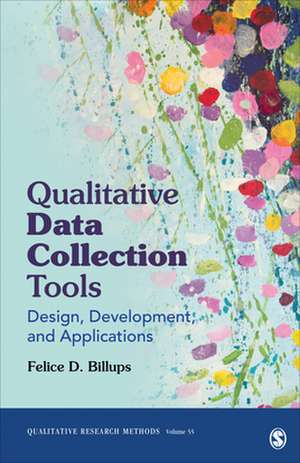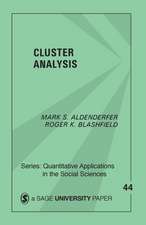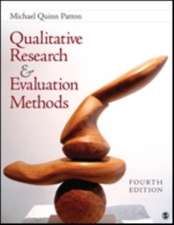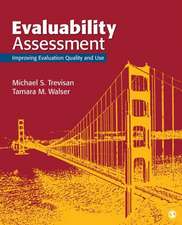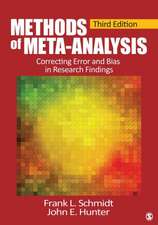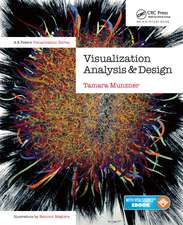Qualitative Data Collection Tools: Design, Development, and Applications: Qualitative Research Methods, cartea 55
Autor Felice D. Billupsen Limba Engleză Paperback – 30 apr 2020
Din seria Qualitative Research Methods
-
 Preț: 286.15 lei
Preț: 286.15 lei -
 Preț: 322.19 lei
Preț: 322.19 lei -
 Preț: 273.68 lei
Preț: 273.68 lei -
 Preț: 286.15 lei
Preț: 286.15 lei -
 Preț: 323.15 lei
Preț: 323.15 lei -
 Preț: 321.79 lei
Preț: 321.79 lei -
 Preț: 323.70 lei
Preț: 323.70 lei -
 Preț: 321.52 lei
Preț: 321.52 lei -
 Preț: 322.05 lei
Preț: 322.05 lei -
 Preț: 134.60 lei
Preț: 134.60 lei -
 Preț: 288.79 lei
Preț: 288.79 lei -
 Preț: 290.33 lei
Preț: 290.33 lei -
 Preț: 317.26 lei
Preț: 317.26 lei -
 Preț: 287.82 lei
Preț: 287.82 lei -
 Preț: 290.54 lei
Preț: 290.54 lei -
 Preț: 289.56 lei
Preț: 289.56 lei -
 Preț: 288.04 lei
Preț: 288.04 lei - 18%
 Preț: 715.81 lei
Preț: 715.81 lei -
 Preț: 291.07 lei
Preț: 291.07 lei -
 Preț: 290.69 lei
Preț: 290.69 lei -
 Preț: 288.41 lei
Preț: 288.41 lei -
 Preț: 289.18 lei
Preț: 289.18 lei -
 Preț: 317.26 lei
Preț: 317.26 lei -
 Preț: 288.19 lei
Preț: 288.19 lei -
 Preț: 290.33 lei
Preț: 290.33 lei -
 Preț: 290.69 lei
Preț: 290.69 lei -
 Preț: 317.10 lei
Preț: 317.10 lei -
 Preț: 315.75 lei
Preț: 315.75 lei -
 Preț: 290.69 lei
Preț: 290.69 lei -
 Preț: 290.33 lei
Preț: 290.33 lei -
 Preț: 315.36 lei
Preț: 315.36 lei -
 Preț: 290.54 lei
Preț: 290.54 lei -
 Preț: 290.69 lei
Preț: 290.69 lei -
 Preț: 290.69 lei
Preț: 290.69 lei -
 Preț: 291.07 lei
Preț: 291.07 lei -
 Preț: 285.77 lei
Preț: 285.77 lei -
 Preț: 289.77 lei
Preț: 289.77 lei -
 Preț: 315.36 lei
Preț: 315.36 lei -
 Preț: 288.04 lei
Preț: 288.04 lei -
 Preț: 289.95 lei
Preț: 289.95 lei -
 Preț: 285.62 lei
Preț: 285.62 lei -
 Preț: 288.19 lei
Preț: 288.19 lei -
 Preț: 285.62 lei
Preț: 285.62 lei -
 Preț: 316.12 lei
Preț: 316.12 lei -
 Preț: 314.76 lei
Preț: 314.76 lei
Preț: 323.44 lei
Nou
Puncte Express: 485
Preț estimativ în valută:
61.90€ • 64.38$ • 51.10£
61.90€ • 64.38$ • 51.10£
Carte disponibilă
Livrare economică 24 martie-07 aprilie
Livrare express 08-14 martie pentru 28.19 lei
Preluare comenzi: 021 569.72.76
Specificații
ISBN-13: 9781544334820
ISBN-10: 1544334826
Pagini: 240
Dimensiuni: 140 x 216 x 18 mm
Greutate: 0.3 kg
Ediția:1
Editura: SAGE Publications
Colecția Sage Publications, Inc
Seria Qualitative Research Methods
Locul publicării:Thousand Oaks, United States
ISBN-10: 1544334826
Pagini: 240
Dimensiuni: 140 x 216 x 18 mm
Greutate: 0.3 kg
Ediția:1
Editura: SAGE Publications
Colecția Sage Publications, Inc
Seria Qualitative Research Methods
Locul publicării:Thousand Oaks, United States
Recenzii
I think that the more exposure that students have to instrumentation the more informed that can be when they build their own research studies.
[This text] offers a rich and much-needed perspective in the field of qualitative research.
A comprehensive guide for the novice and even intermediate qualitative researcher. I highly recommend this easy-to-follow textbook for anyone considering a qualitative study.
This new book fills a dire need in qualitative research--effectively and rigorously designing qualitative interview instruments and observation and artifact rubrics. (The author) has skillfully woven together necessary elements of qualitative design, research strategies, and research question development in order for researchers to operationalize their curiosities into successful, effective, and ethical research studies. I am particularly taken by the tone of the book. (The author) has written a book that challenges yet scaffolds readers to produce qualitative research studies with integrity and rigor.
This is a very practical text for doctoral students learning research, in particular for those doctoral students in professional non-traditional doctoral degree programs who have never been exposed to the process of conducting qualitative research. The text brings students through the journey of qualitative data collection and provides a how-to approach to qualitative methodology.
[This text] offers a rich and much-needed perspective in the field of qualitative research.
A comprehensive guide for the novice and even intermediate qualitative researcher. I highly recommend this easy-to-follow textbook for anyone considering a qualitative study.
This new book fills a dire need in qualitative research--effectively and rigorously designing qualitative interview instruments and observation and artifact rubrics. (The author) has skillfully woven together necessary elements of qualitative design, research strategies, and research question development in order for researchers to operationalize their curiosities into successful, effective, and ethical research studies. I am particularly taken by the tone of the book. (The author) has written a book that challenges yet scaffolds readers to produce qualitative research studies with integrity and rigor.
This is a very practical text for doctoral students learning research, in particular for those doctoral students in professional non-traditional doctoral degree programs who have never been exposed to the process of conducting qualitative research. The text brings students through the journey of qualitative data collection and provides a how-to approach to qualitative methodology.
Cuprins
List of Tables
List of Templates
Preface
Acknowledgments
Glossary of Terms
About the Author
Chapter 1: The Qualitative Data Collection Cycle
What is Qualitative Research?
The Sources of Qualitative Data
Qualitative Data Collection Tools
Chapter 2: Using the Research Question to Guide Qualitative Data Collection Tool Design
The Role of the Research Question in the Design of Qualitative Tools
Connecting Qualitative Designs with Guiding Questions, the Research Purpose, and the Research Questions
Connecting Qualitative Designs with Data Collection Strategies and Tools
Piloting Qualitative Tools
Chapter 3: Conducting the Qualitative Study: Researcher Role, Access, Trustworthiness, and Ethical Concerns
The Researcher’s Role in Qualitative Research
Researcher Bias and the Practice of Bracketing
The Researcher’s Access to Data
Trustworthiness in the Qualitative Study
Ethics in Qualitative Research
Chapter 4: Interview Protocols
Interviewing Defined
Interview Applications
Requisite Skills and Characteristics of the Interviewer
Interview Formats and Types
Getting Started With a Basic Template
Template Variations: Interview Protocols for Specific Qualitative Designs
Piloting the Interview Protocol
Transforming Interview Data for Analysis
Chapter 5: Conversational and Discourse Analysis Tools
Conversational and Discourse Analysis Defined
Conversational and Discourse Analysis Applications
Requisite Skills and Characteristics of the Conversational and Discourse Analysis Researcher
Conversational and Discourse Analysis Formats
Getting Started with a Basic Template
Template Variations and Challenges
Piloting Conversational and Discourse Analysis Tools
Transforming Conversational and Discourse Data for Analysis
Chapter 6: Focus Group Moderator Guides
Focus Groups Defined
Focus Group Applications
Requisite Skills and Characteristics of the Focus Group Moderator
Focus Group Types and Variations
Getting Started with a Basic Template
Template Variations: Focus Group Moderator Guides by Focus Group Type
Piloting Focus Group Moderator Guides
Transforming Focus Group Data for Analysis
Chapter 7: Observation Tools
Observation Defined
Observation Applications
Requisite Skills and Characteristics of the Observer
Observation Formats
Getting Started with the Basic Template
Basic Observation Templates
Piloting Observation Rubrics
Transforming Observation Data for Analysis
Chapter 8: Document and Artifact Analysis Tools
Documents and Artifacts Defined
Document and Artifact Applications
Requisite Skills of Document and Artifact Recorders
Document and Artifact Types
Getting Started with a Basic Template
Template Variations and Challenges
Piloting Document and Artifact Rubrics
Transforming Document and Artifact Data for Analysis
Chapter 9: Reflective Practice Tools
Reflective Practices Defined
Reflective Practice Applications
Requisite Skills of the Reflective Researcher and Participant Reflections
Reflective Format Types
Getting Started With the Basic Templates
Template Variations for Reflective Tools
Piloting Reflective Tools
Transforming Reflective Data for Analysis
Chapter 10: Synthesis: The Qualitative Story
A Multifaceted Enterprise
The Practitioner’s Perspective
The Qualitative Design Process
A Plan for Action
Recommendations
Conclusion
Appendices: A Case Study of Department X
Appendix A Exemplar: Unstructured Interview Protocol
Appendix B Exemplar: Semistructured Interview Protocol
Appendix C Exemplar: Focus Group Moderator’s Guide: Single Purpose
Appendix D Exemplar: Observation Rubric for Formal or Informal Settings
Appendix E Exemplar: Combined Document/Artifact Rubric
Appendix F Exemplar: Single Question Reflective Questionnaire
Appendix G Exemplar: Data Collection Plan
Recommended Qualitative Research Websites
References
Index
List of Templates
Preface
Acknowledgments
Glossary of Terms
About the Author
Chapter 1: The Qualitative Data Collection Cycle
What is Qualitative Research?
The Sources of Qualitative Data
Qualitative Data Collection Tools
Chapter 2: Using the Research Question to Guide Qualitative Data Collection Tool Design
The Role of the Research Question in the Design of Qualitative Tools
Connecting Qualitative Designs with Guiding Questions, the Research Purpose, and the Research Questions
Connecting Qualitative Designs with Data Collection Strategies and Tools
Piloting Qualitative Tools
Chapter 3: Conducting the Qualitative Study: Researcher Role, Access, Trustworthiness, and Ethical Concerns
The Researcher’s Role in Qualitative Research
Researcher Bias and the Practice of Bracketing
The Researcher’s Access to Data
Trustworthiness in the Qualitative Study
Ethics in Qualitative Research
Chapter 4: Interview Protocols
Interviewing Defined
Interview Applications
Requisite Skills and Characteristics of the Interviewer
Interview Formats and Types
Getting Started With a Basic Template
Template Variations: Interview Protocols for Specific Qualitative Designs
Piloting the Interview Protocol
Transforming Interview Data for Analysis
Chapter 5: Conversational and Discourse Analysis Tools
Conversational and Discourse Analysis Defined
Conversational and Discourse Analysis Applications
Requisite Skills and Characteristics of the Conversational and Discourse Analysis Researcher
Conversational and Discourse Analysis Formats
Getting Started with a Basic Template
Template Variations and Challenges
Piloting Conversational and Discourse Analysis Tools
Transforming Conversational and Discourse Data for Analysis
Chapter 6: Focus Group Moderator Guides
Focus Groups Defined
Focus Group Applications
Requisite Skills and Characteristics of the Focus Group Moderator
Focus Group Types and Variations
Getting Started with a Basic Template
Template Variations: Focus Group Moderator Guides by Focus Group Type
Piloting Focus Group Moderator Guides
Transforming Focus Group Data for Analysis
Chapter 7: Observation Tools
Observation Defined
Observation Applications
Requisite Skills and Characteristics of the Observer
Observation Formats
Getting Started with the Basic Template
Basic Observation Templates
Piloting Observation Rubrics
Transforming Observation Data for Analysis
Chapter 8: Document and Artifact Analysis Tools
Documents and Artifacts Defined
Document and Artifact Applications
Requisite Skills of Document and Artifact Recorders
Document and Artifact Types
Getting Started with a Basic Template
Template Variations and Challenges
Piloting Document and Artifact Rubrics
Transforming Document and Artifact Data for Analysis
Chapter 9: Reflective Practice Tools
Reflective Practices Defined
Reflective Practice Applications
Requisite Skills of the Reflective Researcher and Participant Reflections
Reflective Format Types
Getting Started With the Basic Templates
Template Variations for Reflective Tools
Piloting Reflective Tools
Transforming Reflective Data for Analysis
Chapter 10: Synthesis: The Qualitative Story
A Multifaceted Enterprise
The Practitioner’s Perspective
The Qualitative Design Process
A Plan for Action
Recommendations
Conclusion
Appendices: A Case Study of Department X
Appendix A Exemplar: Unstructured Interview Protocol
Appendix B Exemplar: Semistructured Interview Protocol
Appendix C Exemplar: Focus Group Moderator’s Guide: Single Purpose
Appendix D Exemplar: Observation Rubric for Formal or Informal Settings
Appendix E Exemplar: Combined Document/Artifact Rubric
Appendix F Exemplar: Single Question Reflective Questionnaire
Appendix G Exemplar: Data Collection Plan
Recommended Qualitative Research Websites
References
Index
Notă biografică
Felice D. Billups is a professor in the Educational Leadership doctoral program at Johnson and Wales University in Providence, Rhode Island. She teaches courses in educational research and organizational behavior, specializing in qualitative and mixed methods research applications, and organizational culture studies. As a former college administrator, she has directed programs in strategic planning, institutional research and effectiveness, regional and specialized accreditation processes, and academic program reviews.
Descriere
Qualitative Data Collection Tools by Felice D. Billups is a new and unique supplementary text that will guide students and new researchers to design, develop, pilot, and employ qualitative tools in order to collect qualitative data.
